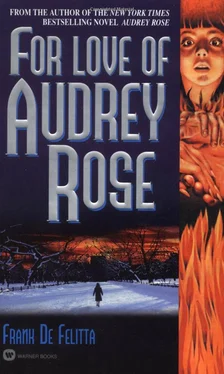“Elliot, only you can reach him. Only you can break through to him. You must explain to him…”
“What? That I did the equivalent of killing his daughter? Caused her to be reborn in misery? Is that what Bill needs to hear?”
Hoover calmed himself by a violent exertion of will, like wrestling against his own body. Slowly his face and breathing returned to normal.
“Bill has to learn to live,” Janice said, pleading. “He has to give up this obsession.”
Hoover softened. He was wavering.
“Yes,” he whispered sadly. “He must give up the obsession. I’d give my right arm if someone could have prevented me.”
Outside the monks chanted, a rock-steady chorus, attuned to each change in the timbre of their voices. The sound of them restored Hoover’s self-discipline.
“But I can’t do it, Janice,” he said, rising again. “Don’t even ask.”
Slowly Janice stood up to face him.
“Bill escaped from the sanitarium last February. He went searching for his daughter.”
Hoover’s face became even more drawn.
“I pity your husband,” he mumbled. “I pray for his soul. But you must leave me alone. You don’t know what your being here has done to me.”
“He kidnapped a little girl, Elliot. He went to Spanish Harlem and stole her from her mother’s arms.”
“Dear God,” he whispered.
“They shot him, Elliot, to get the girl back. I had to betray him so they could shoot him on a rooftop—”
His large rough hand sealed her lips.
“Please stop,” he whispered stridently. “You’re crucifying me. Isn’t one soul burden enough? Am I to bear Bill’s too?”
She saw the moist eyes, white and an annihilating blue. A stranger on whom her life depended.
“You’re the only man in the world he will believe anymore,” she said. “As long as he believes his daughter exists again…”
“Then what?”
“Then he lives inside his own black world. No one can reach him. He trusts no one. He just disintegrates more each day.”
A baboon laughed raucously among the dense black tropical forms far away. Hoover’s head turned, attuned to the signals of the forest. The branches creaked in a sudden breeze, lifting and falling. He watched them as though they communicated a secret, occult message.
“I can’t go to New York, Janice,” he said softly.
“Elliot, what about the belief in ahimsa —nonviolence to living beings?”
Suddenly he leaped forward, grabbed her arm, and hissed into her ear. “ Go home! I need to be alone! I need to atone! I need isolation.”
His breath was hot, sweet-smelling. His body was crushed up against hers, and his eyes were wild.
“I need to be where there are no women!” he blurted.
Then he stormed out of the hut and across the compound. Through the open door she watched him run toward the edge of the ashram, pick something from the ground— a bedroll — and disappear like a wild beast into the forest.
“Elliot!” she shouted, her voice shocking the humming of the forest into silence. “Elliot!”
But he was gone. Janice hesitated, then returned to her hut. His last words buzzed angrily through her mind. What disturbed her most was how vulnerable Hoover turned out to be. It was he who was lost, utterly alone, fighting for his sanity as much as Bill.
Janice lay on the reed mat. She looked at the thatched roof. There were no answers for her. None.
Elliot Hoover did not appear in the morning or in the afternoon. The monks ignored her. They did not object when she prepared a few tomatoes and peppers for herself, or drank from the well. Neither did they help her in any way. At nightfall only the two boys, Meti and Sunjay, acknowledged her existence. Though she looked she found no paths that led from the ashram into the jungle.
On the third day one of the monks bowed slightly to her and beckoned for her to follow. Janice rose from the doorway of her hut and followed the flapping crimson robe into the thickets.
As the monk led her away from the compound a weird gloom enveloped them, a perpetual twilight caused by the thickness of the vines and leaves overhead. Butterflies floated twenty feet over their heads like underwater fish, brilliant scarlet, yellow, and white. The monk never looked back. There were no posts, no notched trees, no signs that she could see, but he walked unerringly, rapidly into the depths of the forest.
They found Elliot Hoover at a small pool. A trickle of rainwater fell like a thin waterfall over a mossy ledge into the pool. Apparently pilgrims had used the site often, for one edge of the shore was worn smooth, and a tiny wooden shrine had been built, supported on posts. A painting of a many-armed deity was visible, and below it, Elliot Hoover, legs folded, aware of all things around him and within him. The monk spoke lightly to him, bowed slightly, and left. For a long time neither Janice nor Hoover moved. Then he opened his eyes and looked peacefully at the placid pool, where the jungle breeze created cross-patterns of ripples on the silvery green surface.
“This was the only peace I ever knew,” he said distantly.
“There are those who have never known peace,” she replied very quietly.
He closed his eyes.
Tall grasses shivered on the shore. Peculiar floating reeds moved in subtle currents just under the surface, making the water dense and green. Yellow fish darted through the reeds, gulping. Hoover seemed to be aware of them, smiling sadly in sympathy, listening to the movement of water, though his eyes remained closed.
“I have prayed to Lord Shiva,” he said. “And to Lord Krishna. And I must go to New York.” A gentle breeze stirred his nearly blond hair, as though caressing his sorrowful face. “One accumulates debts,” he said. “Spiritual debts. And one must repay them.”
“There is no way that I can thank you enough,” Janice whispered, afraid to say more, afraid of disturbing his unearthly tranquility.
For a long time he said nothing else. A branch floated like a spear, turning around slowly, end over end, as it reached the base of the waterfall. It glided like a living thing over the dense mass of submerged reeds, nosing its way toward Hoover, black and glistening.
“Whether or not your husband has found his daughter,” he said gently, “I must insure that he not commit the same crime that I did.”
He closed his eyes. His days of prayer seemed to have drained his physical strength. Once again his face looked drawn, as though he needed more than anything to sleep quietly again.
“Yes,” he concluded, to himself, “such is my duty.”
Hoover stood up painfully. Gently he dusted off his dark crumpled trousers. He looked defeated. He gazed at the pond in affection.
“It will take us a week to get out of the mountains,” he said. “Are you well enough for the journey?”
“Yes. I can make it.”
He laughed, a laugh that seemed to come from the far side of the ocean, not his at all, as though his soul had laughed and his soul was no longer in his slender body.
“Physical journeys wear out the body, but spiritual journeys are the most dangerous.”
“Believe me,” she said earnestly, “I do not underestimate the self-sacrifice.”
“No, but you underestimate the dangers.”
Hoover led her back into the forest. She had the intuition that he was frightened of her. More than that. As she followed his sure steps over the thick green vines, on the ever-damp jungle floor, she knew that his spirit found no peace in her presence. A woman knows what a man means when he holds her, even for a split second. And the passion that had pressed her against the darkness of the hut had nothing to do with religion.
Читать дальше












